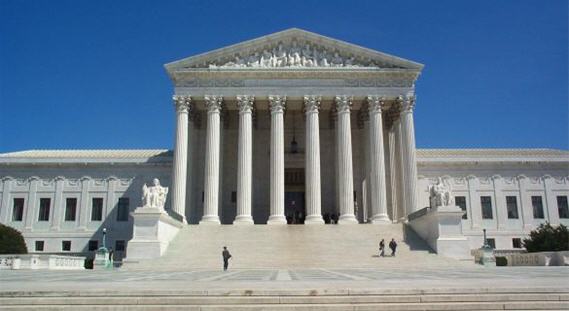White House To Supreme Court: Not So Fast On That ObamaCare Lawsuit
The Federal Government has filed its response to Virginia's request for an expedited review of Virginia v. Sebelius, and they've got an compelling argument against rushing things.
The Federal Government has filed its opposition to Virginia’s petition to the Supreme Court for an expedited review of the state’s challenge to the Affordable Care Act that bypasses the 4th Circuit Court of Appeals:
The Obama administration told the Supreme Court on Monday night it should stay away from a high-profile challenge to the 2010 health care law until after a lower court has had a chance to review the case.
Acting Solicitor General Neal Katyal wrote, “there is no basis for short-circuiting the normal course of appellate review.” Katyal also says Virginia Attorney General Ken Cuccinelli’s case is problematic because he may lack sufficient standing to challenge the health care law.
The Supreme Court normally takes cases only after they’ve been reviewed at least once by appellate judges. Virginia Attorney General Ken Cuccinelli says that’s not appropriate in this instance.
In his filing last month, Cuccinelli said there’s a “palpable consensus” that the high court will ultimately have to pass judgment on the merits of President Obama’s health care law and should do so without delay. Furthermore, Cuccinelli argues that his case involves “pure issues of constitutional law” that appellate judges on the Fourth Circuit U.S. Court of Appeals will be unable to definitively resolve.
Katyal says there is no question that the case is of great public importance but uses the language of the court’s own rules to say it is not “one of the rare cases that justifies deviation from normal appellate practice and require[s] immediate determination in this court.” Katyal points out that the Virginia case and several others are already in the pipeline and little time may be saved if the court were to jump in now.
Brad Joondeph at the ACA Litigation Blog, which I recommend following if you want to keep up-to-date on all the lawsuits against the Affordable Care Act, excerpts the key portion of the Government’s position on the issue of expediting appeal:
Here is the crux of the SG’s position, clipped from the introductory paragraph to the brief’s argument section:
“The parties are currently briefing this case in the court of appeals on an expedited basis. The opening brief for the Secretary of Health and Human Services has already been filed in that court (along with 19 amici briefs), and oral argument is scheduled to be held in approximately 60 days. Especially given the court of appeals’ imminent consideration of this case, there is no basis for short-circuiting the normal course of appellate review by granting a writ of certiorari before judgment. Moreover, this case would make a poor vehicle to address the constitutionality of the Affordable Care Act’s minimum coverage provision because petitioner’s claim to standing rests entirely on a novel “declaratory” state statute (Pet. App. 66), and that threshold jurisdictional question could readily prevent the Court from reaching the merits of petitioner’s claim. The petition should be denied.”
In other words, (1) the Court is likely to get this issue (if not this precise case) next Term regardless, and (2) this particular case has a glaring vehicle issue.
The standing issue that the Government refers to is the fact that, unlike the 26 state lawsuit in Florida, the Virginia lawsuit contains no individual Plaintiffs. The Commonwealth of Virginia asserts it has standing to challenge the Affordable Care Act based solely on a Virginia statute that was passed a year ago which makes it a violation of Virginia law to require someone to buy health insurance. One recent paper argues that the Commonwealth’s standing here rests on a very precarious basis:
Virginia v. Sebelius is a federal lawsuit in which Virginia seeks the invalidation of President Obama’s signature legislative initiative of healthcare reform. Virginia seeks declaratory and injunctive relief to vindicate a state statute declaring that no Virginia resident shall be required to buy health insurance. To defend this state law from the preemptive effect of federal law, Virginia contends that the federal legislation’s individual mandate to buy health insurance is unconstitutional. Virginia’s lawsuit is one of the most closely followed and politically salient federal cases in recent times. Yet neither the federal government nor any other legal commentator has previously identified the way in which the very features of the case that contribute to its political salience also require that it be dismissed for lack of statutory subject-matter jurisdiction. The Supreme Court has placed limits on statutory subject-matter jurisdiction over declaratory judgment actions in which a state seeks a declaration that a state statute is not preempted by federal law – precisely the relief sought in Virginia v. Sebelius. These limits insulate federal courts from the strong political forces surrounding lawsuits that seek federal court validation of state nullification statutes. This Essay identifies these heretofore neglected limits, shows why they demand dismissal of Virginia v. Sebelius, and explains why it is appropriate for federal courts to be closed to this type of suit.
For some reason this standing issue never received a full airing at the District Court level, but it has been raised in the Court of Appeals, and is the subject of at least two amicus curiae briefs which Joondepth summarizes:
We have discussed this point many times on this blog, going all the way back to Judge Hudson’s initial ruling in August. But this is the first time that the arguments have received a full airing in papers filed with the courts. And I think they show why Virginia has a real problem–why this controversy, properly understood, is non-justiciable. At bottom, a state lacks any cognizable interest in whether a federal law regulating the conduct of private citizens exceeds Congress’s enumerated powers (absent some other direct impact on the state itself). Virginia’s Health Care Freedom Act simply does nothing to alter this basic fact. A contrary rule would effectively permit states, by passing similar nullification laws, to challenge in federal court any federal law with which they disagree.
Now one might wonder, if these standing arguments are so compelling, why hasn’t DOJ emphasized them more in its filings? There is a rather simple explanation, I think. Even if Virginia (and the states in the Florida litigation) lack standing to challenge the minimum essential coverage provision, there are plenty of private individuals (such as those in the Liberty University case already before the Fourth Circuit, or the private plaintiffs in Florida v. HHS) who do have standing. Indeed, the DOJ, after contesting it in early stages of the litigation, has largely conceded the point. So DOJ will have to defend the constitutionality of ACA 1501(b) regardless, and who has standing only affects who will be the party against whom DOJ is making the argument. Given this inevitability, it makes little sense for DOJ to spend much of its scarce briefing space on whether Virginia has standing.
In its brief to the Supreme Court, the Federal Government points to this standing issue to remind the Justices that this case may be resolved at the Court of Appeals on a basis entirely unrelated to the merits of the case, and that they should at least let the lower level court look at the issue before taking the case.
The other issue, of course, is timing. Virginia v Siebelius is on track for oral argument before summer, or early in the summer. The ruling is likely to come down in more than enough time for an appeal to be filed, by either side, during the Supreme Court’s 2011-12 term. Is there really a reason to rush things? Frankly, I will be very surprised if the Court takes this appeal.







This is going to end up in the Supreme Court, why wait? Is it the administrations hopes a sudden change of mind of the American people they do not mind being forced to purchase a good or service by the government simply because of citizenship? It will be defunded and will be the downfall of this misadministration. But then what do you expect from Chicago goons?
Wiley,
Because that’s how the judicial system works.
The court system is not governed by opinions of citizens.
Too bad about that whole veto thing.
And by “opinions of citizens” I meant “public sentiment.” Judges, of course, are citizens whose opinions count quite a bit.
“For some reason this standing issue never received a full airing at the District Court level, but it has been raised in the Court of Appeals, and is the subject of at least two amicus curiae briefs ”
One of the amici is Kevin Walsh, the author of the paper that challenged Virginia’s standing. Interesting that were it not for the inclusion of individual plaintiffs in the other states’ suits, they too would be on the same shaky ground resulting from the same flaw Professor Walsh found in the Virginia suit. It may be that the courts will rule that the states do not have standing, but that the suits can go forward on the basis of the individual complaints.
After cutting through all the lawyer jibber jabber you get to the fact the Obama Administration is afraid of losing this. Of course the longer they stall the more damage is being done the present system so it forces people to become supporters politically and maybe even supporters of single pay. Sort of a ‘mess it so bad and they’ll have to like our new proposal’ plan.
Wiley has it right, power mad goons bullying their way to success at any cost.
“After cutting through all the lawyer jibber jabber you get to the fact the Obama Administration is afraid of losing this. ”
And on what do you base that on?
“Wiley has it right, power mad goons bullying their way to success at any cost.”
Bullshit.
Games played to prevent the process from working smoothly – because the Administration is afraid of losing. How’s that for “transparency?” Gum up the works in every way possible, despite that the majority of Americans don’t even want the package.
To a modern “educated” attorney, when it comes to liberal legislation and mandates, constitutionality is just a hurdle to get over – not a measure of possible excessive reach by governmental authority. However, if it’s a conservative – oriented issue then by gosh, it’s just plain wrong and call out the black robes as soon as possible! We must put a stop to this affront to humanity, blah, blah, blah, etc.
Neil, let me clue you in on some very basic issues of American civics:
1) By the Constitution (Article I, Section 7), “All Bills for raising Revenue shall originate in the House of Representatives; but the Senate may propose or concur with Amendments as on other Bills.”
2) The Republicans control the House.
3) The Democrats in the House don’t have the option of pulling a “fleebagger” and running away from DC to stop the House from acting.
4) The Senate can add in funding for ObamaCare, but they still need the House’s consent to pass it.
5) A “veto” stops a bill; it doesn’t give the president the right to add stuff in at his discretion. (I can’t believe I have to explain this one to you.)
6) Michelle Bachman says that the ObamaCare bill buried over $100 billion in funding authorizations for it, and makes a pretty convincing case. But be honest — the Obama administration can whiz away that much money in record time, without achieving squat. If that money is there, once it’s gone, they’ve gotta go back to the House — and, again, it’s controlled by Republicans.
7) The biggest feature of a divided government like we have now is that both powers have veto power over actions, and neither can push through anything over the objections of the other. The House can pass all the bills they like, but they need the Senate and Obama to concur. Likewise, the Senate and Obama can do the same, but they need to peel away enough House Republicans to get it into law.
8) Thanks to the Constitutional provision I cited above, the Republicans actually have the more important House in their control. They hold the purse strings, and it’s a simple application of the Golden Rule — them with the gold makes the rules.
You’re welcome for this civics lesson. Perhaps you ought to sue the public schools that let you go out with that woeful ignorance on Government 101.
J.
Jay Tea — Every other Republican who has been in Congress for more than three months is laughing at Bachmann. Because that money she “found” in the bill was debated and debated and debated. It was no surprise to anyone with half a brain — which is why she finds it so stunning. Why you find it convincing I can’t begin to guess.
It would be interesting if those opposed had an alternative solution to this major economic problem that could be seriously considered…but they don’t…it’s just foot stomping and whining and holding their breath like children. It’s like climate change and evolution…just pretend they don’t exist…like the monster under their bunkbeds.
Because that money she “found” in the bill was debated and debated and debated.
Debated when, pray tell? You actually need to be reminded of the fact that no one had actually read the final bill before it was quasi-passed? Dude. Quit while you’re only up to your neck in absurd statements, before it covers your pie-hole.
Unreal.
@wr
Plus the bill was posted online for 72 hours so it could be read. Of course Bachman thinks the shot heard ’round the world was fired from New Hampshire…and rants about socialism while accepting farm subsidies…so consider the source.
Jay,
From “Too bad about that whole veto thing” you drew conclusions that I:
1. Didn’t know which chamber raises revenue.
2. Failed to know who controlled what house at what time.
3. Suggested that House Democrats were going to mount an impossible quorum bust.
4. That by “veto” I meant “add in.”
5. Something about Michelle Bachmann, I stopped reading after her name, as anyone who quotes her for authority on anything is misguided at best and stupid at worse.
6. Rehashed what you said above.
So…what the hell are you talking about?
I will admit I was mistaken: I thought the budget was a joint resolution, not a concurrent resolution, hence my comment above.
But…nothing you wrote addresses that whatsoever. It doesn’t even come close. Its just rambling about divided houses and Michelle Bachman and blah blah blah.
This:
was especially cute considering the point in which I was wrong wasn’t addressed by your “lesson.”
Any other lessons, Professor?
Wr,
To respond to your post:
1. John Roberts is the Chief Justice of the United States Supreme Court.
2. Nebraska has a Unicameral legislative body.
3. [Insert other ramblings that doesn’t address your point.]
Don’t worry Jay Tea, now you don’t need to worry about responding to Wr. I took care of it for you.
It will be defunded
Too bad about that whole veto thing.
What then, pray tell, did you mean? You coupled “defunding” with “veto,” with no prompting whatsoever. If you didn’t intend to proclaim that defunding and vetoes have anything whatsoever to do each other, then perhaps you shouldn’t have put them together like that.
J.
Joint resolutions can be vetoed by the President. Concurrent resolutions can not. I thought that would be obvious in my response. Perhaps you should sue the private schools that let you go out with that woeful ignorance on Government 101.
“Thanks to the Constitutional provision I cited above, the Republicans actually have the more important House in their control. They hold the purse strings, and it’s a simple application of the Golden Rule — them with the gold makes the rules.”
Actually, that’s not correct as you present it. The Constitution says, as you correctly point out:
All bills for raising revenue, i.e, taxation. If the House passes a tax-raising bill, originates a tax bill, then the Senate can amend it, etc. When it comes to appropriations, where the gold is, what you should have pointed to is Article one, Section nine, Clause seven of Constitution, which states that:
But that still does not vest in the House Appropriations Committee plenary authority over the budget. There’s also the Senate Appropriations Committee. It has as strong a voice in the budgeting process as the House committee.
However, you intuition about divided government is pretty much spot on.
I’ve got no beef with the Obama position here; makes perfect sense in fact.
But hit the rewind button and recall that a number of libertarian/states-right advocates supported the idea that the U.S. attorney general need not defend federal laws passed by the Congress, the states can step up to the plate and do so. Or perhaps not.
“I will admit I was mistaken: I thought the budget was a joint resolution, not a concurrent resolution, hence my comment above.”
It has to be a joint resolution if it is to be presented to the president for his signature (as it must if it is a law.) A concurrent resolution just registers the sentiments of the House and Senate and does not have the force of law — i.e. National Take a Rightwinger to Lunch Day…
It’s a concurrent resolution, but the budget guides appropriations. An omnibus spending bill is where the veto would matter.
mantis,
I think that was where my confusion on joint/concurrent was. Thank you.
Another point you should be corrected on Neil: Every single act of Congress that has any effect outside their own chambers has to be presented to the president for his approval. They can override his veto should he exercise that power, but they can’t simply proclaim a law entirely on their own — concurrent, joint, or yellow polka-dotted.
It’s called “checks and balances.”
J.
Jay,
http://senate.gov/reference/glossary_term/concurrent_resolution.htm
The budget is a concurrent resolution and needs no Presidential approval, even if it is, ahem, “polka dotted.”
The appropriation bills that follow a budget are subject to a veto.
The concurrent budget resolution, which directs federal agencies in preparation for the appropriations process–and hence has many effects outside of their chambers–needs no Presidential approval.
Good try on the snark though.
Any other truth bombs you want to drop, Professor?
So far you’ve corrected me on 7 points that were nonexistent, failed to correct me on the one point I had wrong (which I corrected myself) and then tried an eighth time and got it wrong. Do you ever tire of this?
Another refutation:
Under the War Powers Resolution (a joint resolution) (click) states that:
“forces shall be removed by the President if the Congress so directs by concurrent resolution” [1544(c)]
I’m pretty sure the removal of forces affects quite a bit outside of the Congressional chambers.
Too bad my Government 101 was so inferior to Jay Tea’s…
Neil just about everything you say, think and believe is inferior to Jay, and anyone else with tcapability of rational thought. This arguement is silly. The SCOTUS will be the deciding factor of this case. Someone stated this bill was debated. Why did Pelosi say we had to pass the bill to find out what was in it. Are you trying to say Sebelious was given the power, by congress to have the authority to make laws? Good thing most of the commenters here stay here in the echo chamber.
With such defenders as Wiley and Zels, who am I to argue?
Such high-intellect company…
Echo…Echo…Echo…
Wiley : I read some of the bill long before it was passed but then again I could be bothered to look up the bill itself and actually read some of it. I have no idea where you’re getting the crap about no one could read the bill before it passed…
OK, Neil, I’m setting aside the snark, because I think I see where we are disagreeing.
“Concurrent resolutions are not submitted to the President and thus do not have the force of law.”
I tend to ignore things that do not have the force of law, as they are by and large symbolic and irrelevant. My comments were presupposing that we were discussing things that did have the force of law.
The War Powers resolution you cite is a procedure defined by the War Powers Act, which was passed by Congress and promptly vetoed by President Nixon — and then Congress overrode his veto. So while the procedure does give Congress a “force of law” power immune to presidential veto, it’s done within a law that was passed via the Constitutional procedure, and through the checks and balances.
I’m still a bit put off by the “defunding/veto” connection you made, and it was that that set me off, but…
Pax?
J.
@Plunk:
What a perfect distillation of rightwing anti-intellectualism. Mataconis explains why this action is being taken, but that explanation gets in the way of anti-Obama talking points. So it’s just waved away as meaningless “lawyer jibber jabber”.
Did any of the rightwing commenters complaining about this filing actually read the post? I think this bit that Mataconis quoted gets to the heart of it:
So (1) there will not be a time delay, since the Court will likely rule on this in the next Term and (2) any rightwinger who wants to see ACA get overturned should be glad that this particular case is unlikely to be the one that the Court decides on. There are other cases with less obvious causes for dismissal.
Jibber jabber!
Excellent. Just days after going with “Obama is a do-nothing ditherer” in the golf and NCAA threads, we’re already back to “Obama is a power mad goon bullying his way to success at any cost”. The pendulum swings quickly.
J,
Agreed.
-Neil
TG, I’m not anti-intellectual but disagree with the idea of what is motivating this attempt to delay. I believe it is for the reasons I stated but if people want to muddy the waters with legalese I will call it jibber jabber. As they say, if the facts are on your side argue facts, if the law is on your side argue the law, and if neither is on your side pound the table. In this case they employed the other option, delay.
Obama is a do-nothing ditherer when it comes to important things. In this case it’s his Justice Department doing the actual work. The pendulum is not swinging at all. That comes in November 2012.
So they want the court to spend more time in the appeal process than they spent writing and passing the legislation?
Got it.
Charles : Yeah they only spent over a year negotiating and passing the legislature.. The bill itself was a modified version produced during the 90s by the republicans but why let all that stand in the way of a talking point?
“As they say, if the facts are on your side argue facts, if the law is on your side argue the law, and if neither is on your side pound the table. In this case they employed the other option, delay.”
Thus saith Justice Plunk.